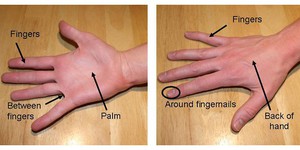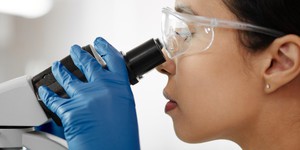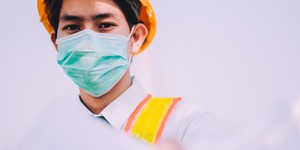Summary
Introduction
How well do you wash your hands? Do you just give them a quick rinse with water, or do you use soap? Do you wash the backs of your hands and in between your fingers? Good hand washing is one of the best ways to prevent the spread of germs and diseases like the flu and common cold. Try this activity to find out if there are hard-to-wash parts of your hands where germs might be hiding!
Materials
- Sink
- Washable paint
- Soap
- Hand towel
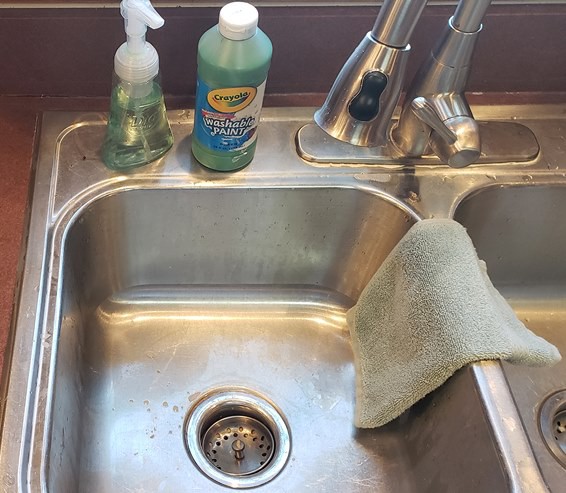 Image Credit: Ben Finio, Science Buddies / Science Buddies
Image Credit: Ben Finio, Science Buddies / Science Buddies
Instructions
- Cover both of your hands in paint, as if you were using hand lotion. Make sure to cover the backs of your hands, in between your fingers, and around your fingernails.
- Hold your hands out and let the paint dry for a three or four minutes.
- Rinse your hands briefly with just warm water. How much paint is left on your hands?
- Rub your hands together briefly under running water. How much paint is left on your hands now?
- Use some soap, and count to 5 while washing your hands. Now how much paint is left?
- Continue to use soap, and wash your hands for another 15 seconds. Examine your hands.Are certain parts of your hands cleaner than others? Where is there still paint left on your hands? What can you do to improve your hand washing?
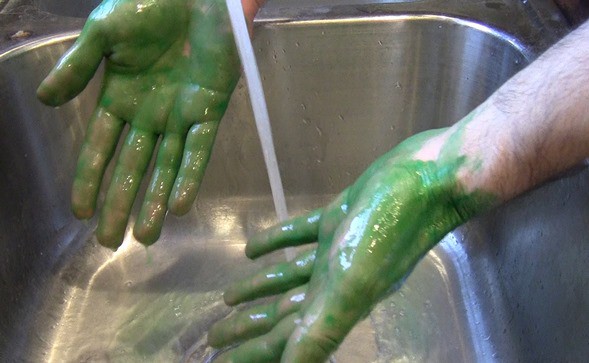 Image Credit: Ben Finio, Science Buddies / Science Buddies
Image Credit: Ben Finio, Science Buddies / Science Buddies
Cleanup
- If needed, continue washing your hands until all the paint is gone.
What Happened?
You probably found that rinsing, or even scrubbing, your hands with only water did a poor job of removing the paint. Soap helps break up the paint and other dirt on your hands, making it easier to remove, along with germs (bacteria and viruses). But even with soap, you have to do a good job washing your hands to remove all the paint. This includes washing them for more than just a few seconds, and getting into all the nooks and crannies where the paint (and germs) can hide.
Digging Deeper
In this experiment, you used paint so you could see whether you "missed a spot" when washing your hands. However, germs—the tiny bacteria and viruses that can cause diseases—are too small to see without a microscope. You cannot see the germs on your hands—so your hands might look clean, even though they are covered in germs! To prevent the spread of germs, including the bacteria that cause food poisoning and the viruses that lead to flu and colds, public health experts recommend these hand washing steps:
- Wet hands
- Apply soap
- Scrub for at least 20 seconds (hum the Happy Birthday song twice)
- Rinse with water
- Dry with a clean towel or air dry
This helps prevent the spread of germs and keep everyone healthier!
Ask an Expert
For Further Exploration
- You can do this experiment with fake 'germ' materials that glow under an ultraviolet light instead of regular paint.
- Try washing your paint covered hands with a blindfold on. How well did you do when you could not see the paint? How might this compare to not being able to see germs?
- Try the experiment with different types of soap.
Disclaimer: Science Buddies participates in affiliate programs with Home Science Tools, Amazon.com, Carolina Biological, and Jameco Electronics. Proceeds from the affiliate programs help support Science Buddies, a 501(c)(3) public charity, and keep our resources free for everyone. Our top priority is student learning. If you have any comments (positive or negative) related to purchases you've made for science projects from recommendations on our site, please let us know. Write to us at scibuddy@sciencebuddies.org.




